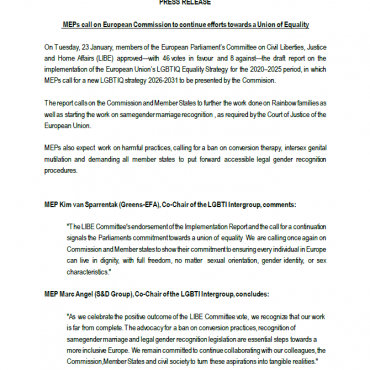Hungarian Presidency of the EU plans on ignoring homophobia
Today the Hungarian Presidency of the Council of the European Union, representing the 27 EU governments until July 2011, failed to outline any plan for action against homophobia and discrimination on grounds of sexual orientation in their 6-month presidency.
 Socialist and Liberal Members of the European Parliament asked the Hungarian Minister of State for Social Inclusion, Mr Zoltán Balog, about planned progress for the horizontal Anti-Discrimination Directive (a draft piece of EU legislation that would forbid discrimination outside of employment on grounds of disability, age, religion or belief, and sexual orientation).
Socialist and Liberal Members of the European Parliament asked the Hungarian Minister of State for Social Inclusion, Mr Zoltán Balog, about planned progress for the horizontal Anti-Discrimination Directive (a draft piece of EU legislation that would forbid discrimination outside of employment on grounds of disability, age, religion or belief, and sexual orientation).
Mr Balog told the Committee on Civil Liberties, Justice and Home Affairs that this lay outside of his ministry portfolio, but nevertheless assured MEPs that “for people living with disabilities, there will be progress in this legislature”*.
Despite two questions left unanswered about the Presidency’s plans to combat discrimination on grounds of sexual orientation as well as a reminder, the Minister continued evading the issue.
Socialist MEP Emine Bozkurt, Member of the LGBT Intergroup, reacted: “It was stunning to see the Minister avoid talking about sexual orientation. The Hungarian Presidency’s lack of ambition is a disgrace: the Anti‑Discrimination Directive has been on the Council’s table for over two and a half years already. Quite on the contrary, we need ambitious action to combat all forms of discrimination.”
ALDE MEP Sophie in’t Veld, Vice-President of the European Parliament’s Intergroup on LGBT Rights, continued: “The Hungarian Presidency chose to ignore this most important draft Directive; this is not surprising, given their less-than-friendly position on LGBT people’s human rights. I am very wary of the Presidency’s announced ‘International Conference on Family’ focusing on birth rates and excluding LGBT families.”
The Intergroup will keep monitoring the programme of the Hungarian Presidency of the Council of the European Union. Future presidencies include Poland (July-December 2011) and Denmark (January-June 2012).
* The English interpretation does not constitute an authentic record of proceedings.






